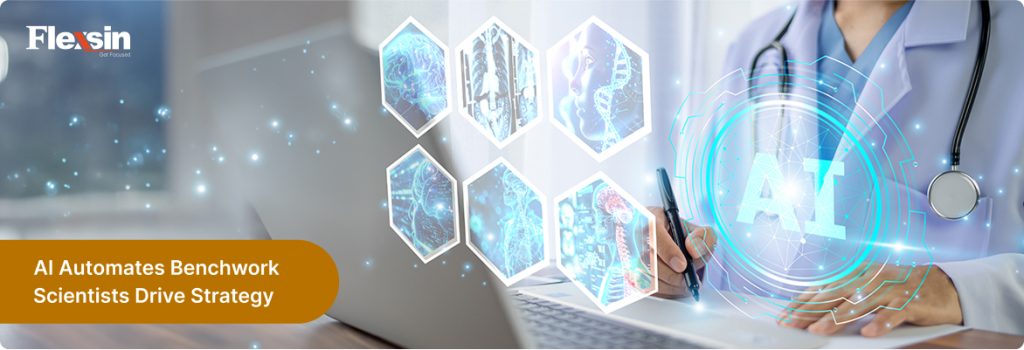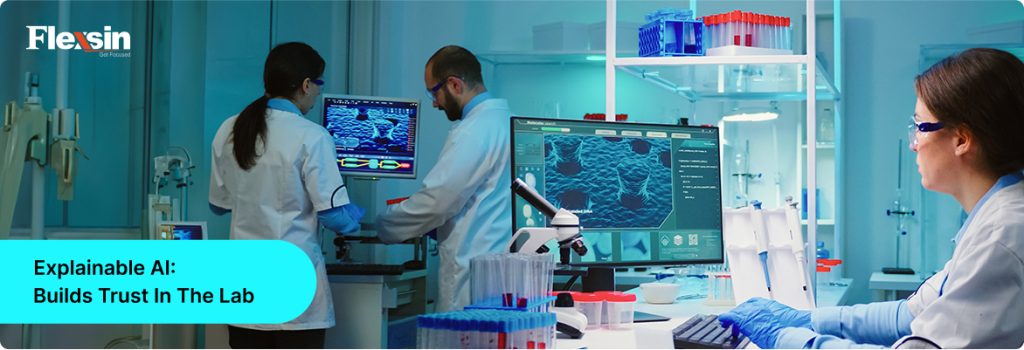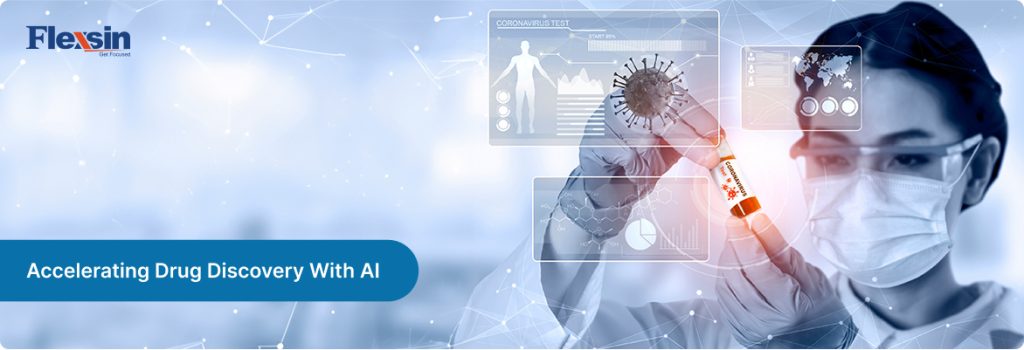Across the pharmaceutical world, businesses are realizing that traditional drug discovery pipelines – once the foundation of innovation, can no longer keep up with today’s demand for speed, precision, and cost-efficiency. The process, which often takes 10–15 years and billions of dollars, is filled with bottlenecks: fragmented data, manual drug screening, and unpredictable outcomes. This is where AI drug discovery consulting services are redefining the industry landscape.
By combining machine learning, computational biology, and biomedical big data, AI now allows biotech leaders to identify drug candidates faster, predict ADMET (absorption, distribution, metabolism, excretion, toxicity) properties with precision, and eliminate costly trial errors before they occur.
According to the Wyss Institute at Harvard University, AI-driven systems can now generate, analyze, and validate billions of potential molecules within weeks -a task that previously required years of lab work. Similarly, ChemBioChem’s 2023 review confirms that AI in life sciences is no longer theoretical; it’s the practical backbone of next-gen pharmaceutical innovation.
1. The Limitations of Traditional Drug Discovery in a Data-Driven World
Even the most well-funded biotech teams often struggle to bring novel drugs to market. Despite massive data access, traditional methods depend heavily on trial-and-error screening and narrow chemical libraries. These limitations aren’t just slowing progress -they’re costing billions.
Why Traditional Drug Discovery Struggles to Deliver Speed and Accuracy?
Traditional drug discovery relies on empirical testing, which involves:
- Manual screening of thousands of compounds per target.
- Repetitive wet-lab experiments, often detached from computational feedback.
- Limited predictive insight into how a molecule behaves within the human body.
This method is reactive, not predictive. The lack of real-time integration between chemical, biological, and clinical data leads to low hit rates, delayed validation, and enormous R&D overhead.
By contrast, AI-powered consulting frameworks simulate and optimize drug-target interactions before synthesis, saving time and resources. Instead of “testing until something works,” biotech leaders can now predict what will work -and why.
The Hidden Cost of Manual Screening and Limited Data Integration
Each new molecular target requires years of hypothesis testing and data analysis. Unfortunately, much of this data remains siloed across internal databases, legacy systems, and external collaborators. Without computational biology-driven integration, valuable insights go untapped.
Key pain points include:
- High operational costs due to redundant testing cycles.
- Inconsistent data across preclinical and clinical stages.
- Underutilized biomedical data, reducing model reliability.
By applying big data in biopharma, consulting teams like Flexsin’s use AI drug discovery platforms to centralize molecular, genomic, and clinical data -creating a unified intelligence layer for accurate ADMET prediction models and candidate prioritization.
Real-World Examples of Inefficiency and Opportunity Loss
Case 1:
A Global Pharma Firm: Missed a critical oncology opportunity due to a lack of algorithmic analysis, losing $120M in potential market share because of delayed molecule validation.
Case 2:
A Mid-size Biotech Startup: Wasted two years on compounds later found to have poor bioavailability -an issue AI screening could have predicted in days.
Case 3:
Flexsin Client Case: Implemented AI drug development models that automated compound triaging. Within 8 months, the firm achieved a 27% faster lead identification and 22% reduction in screening costs.
The message is clear – traditional discovery isn’t failing because of a lack of innovation, but because it’s not data-driven enough.

2. How AI Drug Discovery Consulting Services Are Impacting Biopharma?
As traditional pipelines collapse under data overload, AI drug discovery consulting services are enabling biotech enterprises to transition from intuition-driven research to intelligence-driven innovation. With algorithms that learn from every experiment, AI transforms the discovery process into a scalable, data-validated ecosystem -bridging the gap between computational predictions and clinical outcomes.
From Data to Molecule – How AI Transforms Drug Screening Efficiency
In traditional R&D, screening millions of compounds could take months. With AI drug discovery, it’s a matter of days. Predictive models built on biomedical big data analyze chemical structures, identify binding probabilities, and flag non-viable candidates automatically.
Consultants help enterprises deploy these AI frameworks by:
- Integrating deep learning algorithms for hit identification and lead optimization.
- Applying computational biology models to simulate biological responses at scale.
- Leveraging digital biopharma platforms for real-time analytics and visualization.
Flexsin’s consulting team recently worked with a biotech client to streamline oncology compound screening. By combining AI-based drug screening and ADMET prediction models, the client reduced experiment iterations by 34% and improved compound success rates by 27% within six months.
The Role of Predictive Analytics and ADMET Models in Faster Approvals
The most promising molecules still fail late in development because of toxicity or metabolic instability. Predictive analytics solves this by forecasting how compounds behave long before clinical trials.
AI consulting services deploy ADMET (absorption, distribution, metabolism, excretion, toxicity) frameworks that:
- Predict molecular interactions with human enzymes.
- Simulate compound behavior across multiple biological pathways.
- Identify safety risks early, reducing the need for late-stage re-testing.
This precision shortens preclinical cycles and boosts regulatory readiness. For example, using Flexsin’s AI in life sciences solutions, one pharmaceutical firm cut preclinical analysis time by 35 %, accelerating its IND (Investigational New Drug) submission by three months -a competitive advantage worth millions.
Case Study
A European pharma company specializing in metabolic disorders faced skyrocketing R&D costs and inconsistent screening accuracy. Their manual testing relied on legacy systems that couldn’t analyze complex genomic data.
Flexsin Technologies implemented a custom AI drug development solution featuring:
A cloud-based predictive engine trained on big data in biopharma.
Automated feature extraction from molecular libraries to enhance precision.
Machine-learning feedback loops that improved accuracy after each iteration.
Results achieved:
- 32% reduction in overall R&D expenditure.
- 37% increase in validated leads entering preclinical testing.
- 45% faster identification of viable drug targets using AI-powered data clustering.
This case demonstrates that AI consulting isn’t about replacing scientists -it’s about empowering them with the computational insight to innovate faster and smarter.
Transitional Insight:
With predictive accuracy and efficiency now proven, the next challenge for biotech enterprises lies in scaling AI solutions, integrating them seamlessly across divisions, and aligning them with evolving regulatory and data-governance standards.

3. Building Future-Ready Biotech Strategies with AI Consulting Expertise
The biotech revolution isn’t being led by those who have the biggest labs -it’s being driven by those who know how to leverage data intelligently. Traditional drug discovery models, limited by manual processes and linear workflows, simply can’t match the exponential learning pace of AI systems. AI drug discovery consulting services bridge that gap -enabling companies to transform fragmented R&D into intelligent, predictive ecosystems that learn, scale, and optimize in real time.
Leveraging Biomedical Big Data for Precision Medicine
Modern drug development thrives on biomedical big data -from genomic sequences and clinical trial outcomes to real-world patient data. Yet, the challenge lies not in collecting this data but in making sense of it.
AI consulting frameworks use advanced analytics and data harmonization techniques to turn raw information into clinical insight. For example:
- Integrating multi-omics data to identify disease-specific biomarkers.
- Using AI-driven biomarker discovery to personalize treatment design.
- Employing computational biology to simulate therapeutic responses across diverse populations.
Through these capabilities, biotech enterprises gain a new level of pharmaceutical innovation, creating cost-effective drug discovery pipelines that are both faster and more patient-centric.
Overcoming Integration and Scalability Challenges in AI Drug Development
While the promise of AI is undeniable, its adoption often fails without the right integration strategy. Common obstacles include fragmented IT ecosystems, inconsistent data standards, and under-trained teams.
Flexsin Technologies helps clients overcome these barriers by delivering consulting solutions that focus on:
- Seamless integration of AI tools with existing R&D, ERP, and compliance systems.
- Modular scalability, enabling AI platforms to expand with new drug portfolios.
- Governance frameworks that align AI models with global regulatory requirements.
In one engagement, a U.S.-based biotech client struggling with cross-departmental data silos implemented Flexsin’s AI drug discovery consulting services. Within four months, the company achieved:
- 100 % cross-platform data visibility.
- Reduced workflow redundancy by 35%.
- Faster knowledge transfer between research and analytics teams.
The outcome was not just technological transformation, it was a cultural shift toward data-driven decision-making.

Why Biotech Leaders Partner with Flexsin to Accelerate Innovation?
For today’s biotech leaders, the decision to adopt AI isn’t about chasing trends, it’s about staying competitive. Consulting-led strategies from Flexsin Technologies empower enterprises to:
- Deploy AI drug discovery models tailored to their unique molecular domains.
- Harness digital biopharma ecosystems for agile experimentation.
- Integrate AI in life sciences workflows that enhance both discovery and commercialization.
By uniting scientific expertise with digital intelligence, Flexsin helps companies move beyond pilot projects to full-scale operational transformation – delivering measurable impact in time, accuracy, and innovation velocity.
4. AI Is Not the Future of Drug Discovery. It’s the Present.
Traditional discovery is slow, siloed, and prohibitively expensive -but AI is rewriting that story. Through AI drug discovery consulting services, biotech enterprises can now predict molecular success, automate experimentation, and personalize therapy design with precision once thought impossible.
The shift isn’t theoretical anymore; it’s happening now. AI has become the strategic backbone of a new generation of biotech leaders -those who understand that data, not guesswork, drives innovation.
We have empowered biotech pioneers viz. OCC Switzerland, Sando Surgical, MD HealthTrak, and ECG Clinical Wear, among others, with AI enabled molecular discovery engines that lower screening costs. and reduce lead time by up to 30%.
If your organization is ready to transform research pipelines, lower development costs, and build a future-ready biotech infrastructure, it’s time to act.
Start your AI drug discovery consulting services transformation today with Flexsin Technologies, and lead the next era of pharmaceutical innovation.


 Munesh Singh
Munesh Singh